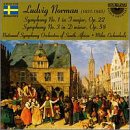| All Artists: Ludvig Norman, Mika Eichenholz Title: Norman: Symphonies Nos. 1 & 3 Members Wishing: 0 Total Copies: 0 Label: Sterling [Qualiton] Release Date: 3/15/2000 Album Type: Import Genre: Classical Style: Symphonies Number of Discs: 1 SwapaCD Credits: 1 UPCs: 675754159528, 7393338103820 |
Search - Ludvig Norman, Mika Eichenholz :: Norman: Symphonies Nos. 1 & 3
 | Ludvig Norman, Mika Eichenholz Norman: Symphonies Nos. 1 & 3 Genre: Classical
|
Larger Image |
CD Details |
CD ReviewsModestly attractive music in acceptable performances G.D. | Norway | 02/10/2010 (3 out of 5 stars) "Ludvig Norman (1831-1885) was a leading figure in Swedish music in his day and thus an obvious candidate for Sterling's important series of releases featuring Swedish composers between Berwald and the five (Peterson-Berger, Stenhammar, Alfvén, Rangström and Atterberg). Norman's music is heavily indebted to Schumann and Schubert and hardly original, yet the themes are pleasant enough, and they are developed with some skill even if both symphonies featured here are rather predictable (the second symphony has been available, at least in Sweden, as well). There are no masterpieces here, then, but I am still glad for having had the opportunity to explore this otherwise closed volume of musical history.
The first symphony (1859) sticks to the rulebook throughout and is, in the end, an eminently forgettable work (even though it is charming enough to deserve a listening). The orchestration is bright and mostly light, even if it sounds a tad clumsy at times, and whereas the themes are seamlessly woven together and developed nothing really interesting is ever achieved with them. The third symphony, from 1881, is more interesting, however. The first movement is dramatic in the vein of Schumann and rather effective, and the slow movement is based on a rather fine melodic idea. The third movement sounds like a rather inconsequential afterthought, but the finale is spirited and moves forward with grace and momentum, somewhat in the manner of Berwald even if the language belongs to somewhere between Schumann and Brahms. It is a very fine work, well worth getting to know. Performances are, however, rough and somewhat heavy-handed, although the National Symphony Orchestra of South Africa does manage to whip up some flair and spirited excitement. Mika Eichenholz seems to have a good grasp of the musical argument and I guess the performances overall should be counted as satisfactory. They aren't exactly helped by a somewhat murky sound quality. Still, this is a very worthwhile release of music (the third in particular) that deserves an occasional airing." |

 Track Listings (8) - Disc #1
Track Listings (8) - Disc #1